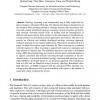7075 search results - page 77 / 1415 » Models and heterogeneous reasoning |
JOCN
2006
13 years 10 months ago
2006
In an event-related fMRI study, we investigated the neurocognitive processes underlying deductive reasoning. We specifically focused on three temporally separable phases: (1) the ...
ICSE
2009
IEEE-ACM
14 years 11 months ago
2009
IEEE-ACM
Features express the variabilities and commonalities among programs in a software product line (SPL). A feature model defines the valid combinations of features, where each combin...
DLOG
2011
13 years 1 months ago
2011
Abstract. The preferential and rational consequence relations first studied by Lehmann and colleagues play a central role in non-monotonic reasoning, not least because they provid...
CORR
2002
Springer
13 years 9 months ago
2002
Springer
Many systems that exhibit nonmonotonic behavior have been described and studied already in the literature. The general notion of nonmonotonic reasoning, though, has almost always ...
ASWC
2008
Springer
14 years 1 days ago
2008
Springer
Abstract. Ontology reasoning is an indispensable step to fully exploit the implicit semantics of Semantic Web data. The inherent distribution characteristic of the Semantic Web and...

